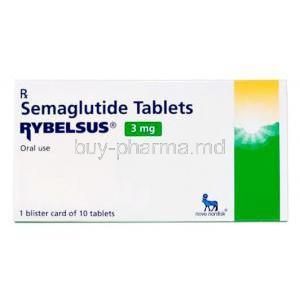Rybelsus (semaglutide) research information.
Rybelsus (semaglutide) is used in combination with diet and exercise to treat type 2 diabetes. It's available in a tablet that only needs to be taken once per day, but it's not the first-choice option for treating type 2 diabetes because it can raise your risk of developing thyroid tumors or cancer.
How Rybelsus (semaglutide) works
Rybelsus (semaglutide) is a glucagon-like peptide-1 (GLP-1) agonist. It activates the GLP-1 receptor, which tells your body to release more insulin, stops your body from releasing more sugar, and slows down your digestion.
What is Rybelsus (semaglutide) used for?
Type 2 diabetes
Typical dosing for Rybelsus (semaglutide)
The typical starting dose is 3 mg by mouth once per day for 30 days. After 30 days, your dose will be raised to 7 mg once per day. If needed, your provider might raise your dose to 14 mg once per day.
Trial details
For the trial, researchers at Northwestern University enrolled 1,961 adults who had a body mass index (BMI) of at least 30, or a BMI of at least 27 with at least one coexisting condition related to their weight that was not Type 2 diabetes. The trial took place at 129 centers across 16 countries, and it involved participants self-injecting either semaglutide or a placebo once each week for 68 weeks. The trial was blinded, so participants do not know whether they were self-administering semaglutide or a placebo. During the study period, participants also "received individual counseling sessions every [four] weeks to help them adhere to a reduced-calorie diet … and increased physical activity," the researchers wrote.
The researchers found that, in total, participants who had self-injected semaglutide lost nearly 15% of their body weight, on average, compared with an average loss of 2.4% among participants in the placebo group. Over a third of the participants in the trial who received semaglutide lost more than 20% of their body weight, the researchers found, and in a number of patients, diabetes and pre-diabetes symptoms improved.
Just under three-quarters of participants who received semaglutide reported gastrointestinal side effects—most commonly nausea, diarrhea, vomiting, and constipation—compared with just under half of those in the placebo group. In addition, 2.6% of patients receiving semaglutide reported gallbladder-related disorders, compared with 1.2% in the placebo group.
A game changer' for weight loss
Robert Kushner, an obesity researcher at Northwestern University Feinberg School of Medicine and a leader of the study, said the results indicate that semaglutide could represent "the start of a new era of effective treatments for obesity."
"I was surprised and gratified to see the unprecedented results from the medication," Kushner said. "The fact that 50% of participants were able to lose at least 15% of initial body weight and one-third lost at least 20% body weight is a game-changer."
Kushner said the next step for evaluating the drug as a weight-loss tool is using it in practice. "We now need to explore how to encourage and educate health care providers to provide obesity care in the primary care setting."
Clifford Rosen from Maine Medical Center Research Institute, who is an editor at NEJM, said he believes semaglutide "has a huge potential for weight loss," and he added that the gastrointestinal side effects reported in the study were "really marginal—nothing like with weight loss drugs in the past."
Stephen O'Rahilly from the University of Cambridge said the trial's results mark "the start of a new era for obesity drug development with the future direction being to achieve levels of weight loss comparable to semaglutide, while having fewer side effects."
O'Rahilly specifically touted the lack of reported psychiatric side effects in the trial. "Unlike some previous appetite suppressant drugs which caused significant psychological and psychiatric side effects, there is no evidence that semaglutide has any adverse effects of that nature," O'Rahilly said.

